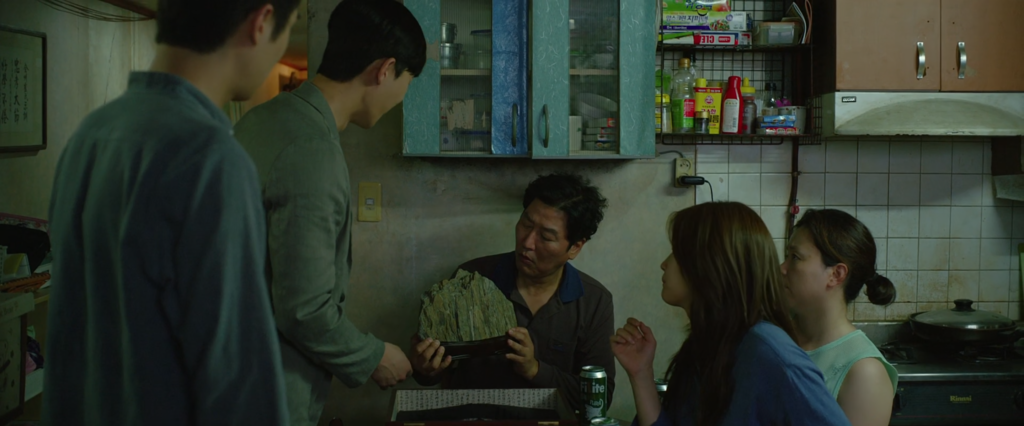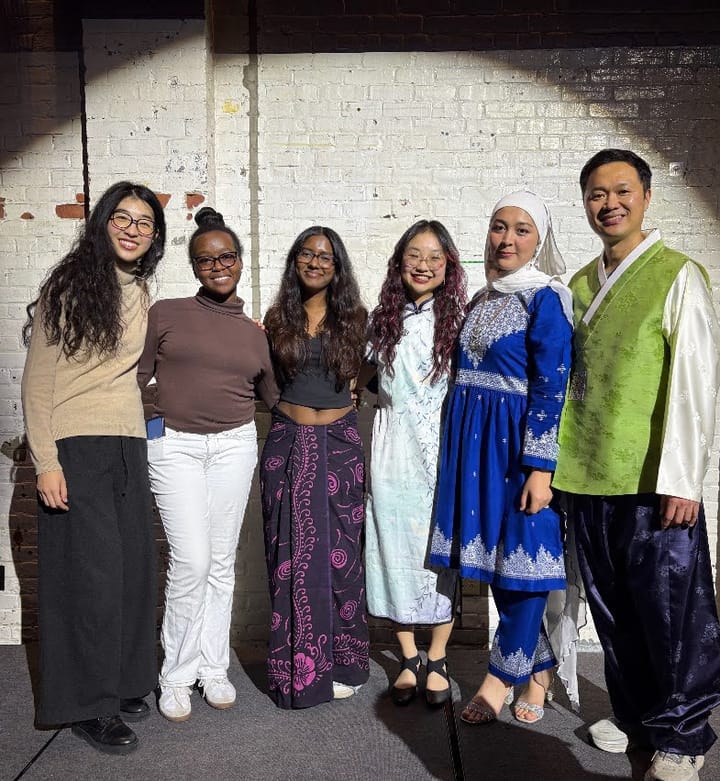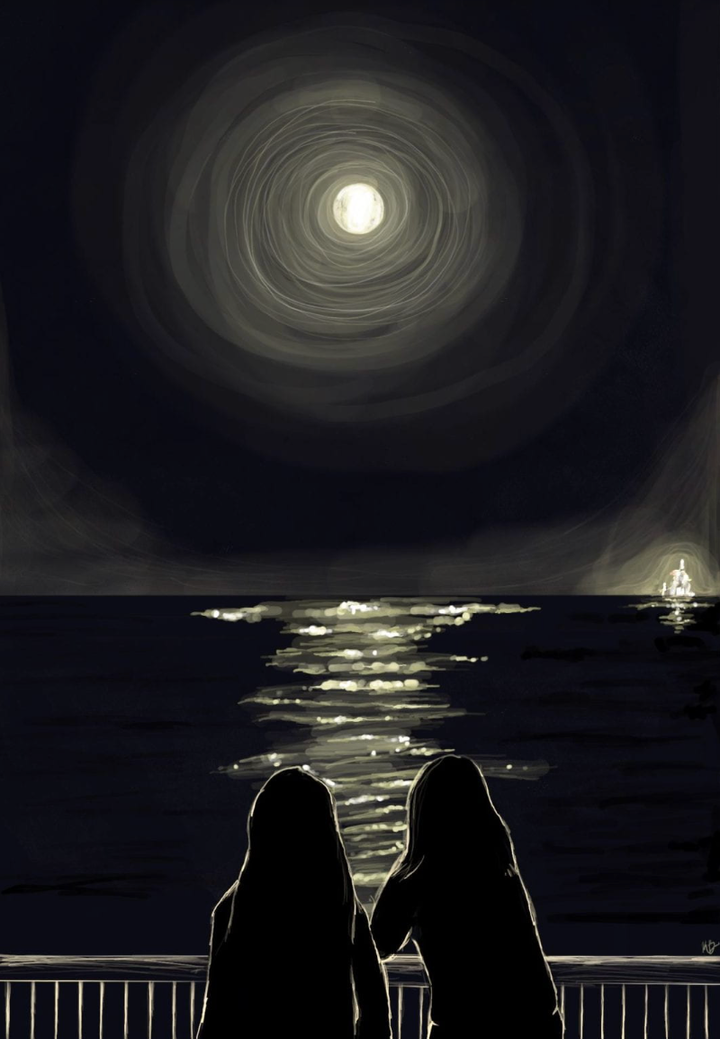“Parasite” Plays with Space and Separation to Shock Audience

Director Bong Joon Ho has done it again. In his latest film “Parasite,” Bong has released a jarring dark satirical comedy that critics have been calling the best film of 2019.
The winner of the prestigious Palme d’Or award at the Cannes Film Festival, “Parasite” is an eerily chaotic film that captures the economic polarization in South Korea through comedic and slightly disturbing means. The story leaves you feeling unsettled and makes you question the ways in which we interact with one another on a socioeconomic level, as well as a humane one. I’ve tried to come to a complete answer as to who the parasite in the movie is, only to reach never-ending theories about how this theme works and how the characters fit into this parasitic image. The complexity of this film was thus hard to summarize.
The movie starts by introducing the Kim family, who reside near the fringes of Seoul, South Korea, in a filthy basement apartment situated below the streets of their neighborhood. With father Ki-Taek (Song Kang Ho) unemployed, mother Chung-sook (Hyae Jin Chang) retired and both son Ki-woo (Choi Woo-shik) and daughter Ki-jeong (Park So-dam) out of college, the family members spend their days folding pizza boxes in exchange for money, hoping to rise out of their poor living conditions. Their wish appears to be granted when Ki-woo gets an opportunity to work as a tutor for his college friend’s wealthy high school client, Da-hye (Jeong Ji-soo).
After he fakes being a student from the prestigious Yonsei University, Ki-woo is hired and begins to work at the elegant house of the wealthy Park family. Noticing the family’s gullibility, Ki-woo soon takes advantage of his situation and devises a plan to slowly get his family members working various jobs for the Park family.
He does this hoping the wealthy family never discover that the Kims are related, poor and, most importantly, had no actual experience in the jobs they scammed themselves into obtaining.
After getting the people who were originally working for the Parks fired, Ki-Taek becomes the family’s personal driver, Chung-sook the housekeeper and Ki-jeong a fake art therapist for the Park’s youngest son, Da-song (Jeong Hyun-joon).
The pacing of the film is chaotic and unpredictable but purposefully so. Moreover, humor is very skillfully utilized. While it seems as though the comedy is simply a collateral of telling a deeper story, the use of humor is strategic in unveiling the economic disparity between the two families. The movie starts out fairly light in tone; the initial plot of the Kims gradually invading the Park household is a heavily comedic one.
The Kims also assume a very humorous dynamic, and their collective effort in tricking this wildly oblivious, rich family into unknowingly hiring all of them was hilarious. The first half of the movie almost establishes it as a comedy, but, as the film continues, it becomes clear that this is simply subtle misdirection. The film wants you to focus on the comedic antics of the Kims and lulls you into a false sense of security.
Considering how the Kims become complacent in their deception and their gradual shift into becoming the assumed “parasites” of the film (feeding off the wealth and cluelessness of the Park family), the humor seems to serve the purpose of making you feel just as complacent and comfortable. In the same way that the rich family is tricked into hiring the Kims, the audience too is fooled into thinking this film is a simple comedy. The later half, however, works to disturb this complacency as the comedy is actually a genius distraction from the hidden, more sinister plot that underlies the movie.
For instance, there is a scene in the middle of the film in which the Kims sneak into the Park household while the family is away on a camping trip. They raid the Park family’s alcohol collection and situate themselves in the living room, laughing at how they’ve gotten away with the scam.
There is a feigned sense of stability in the ease that surrounds them. They’re comfortable with their invasion and don’t see any possible ways it could fail. Interestingly, it is at this point that things take a darker turn in the film. Once the Kims become complacent, the movie shakes itself of its comedy and starts to lean towards a darker narrative.
Bong very cleverly demonstrates the polarization of high and low economic statuses through many different avenues of visual representation. The set design of having the poor family underneath in a sewer-like prison while the rich family resides in an open-spaced, modern, futuristic house was very jarring.
These structures remain spatially separate from each other, but as the poor start to invade the lives of the rich, it is almost as if a bubble is popped and the two seemingly different worlds start to collide. In the movie, the Park family is portrayed as aloof and ignorant to the outside world, and the house feels like it was constructed to represent this ignorance.
Throughout the film there are multiple painstaking references to the divide that the Parks attempt to impose between themselves and the Kim family. Although they are aloof to the whims of the poor, the wealthy family members are also quite aware that the poor exist, and they actively work to separate themselves from being associated with them. They believe they are different and better.
The house itself doesn’t even feel like it belongs within the real world, but rather as its own separate entity existing in isolation. It almost felt as though the Parks were living in a separate utopia that no one could inhabit fully except themselves. Thus, with the popping of this bubble and crossing over of this line, the symbolic structure of these houses does a great job representing the dichotomy between both families.
The spatiality becomes even more significant when you start to notice how these structures fit into the surrounding environments. The cinematography in this film was gorgeous and captivated this economic disparity to an even greater degree.
In the film, there were constant visual jumps between the Kim family’s basement and the Parks’ mansion. As a viewer, I could feel the cramped nature of the Kims’ living situation: a small, dirty apartment that resides on the edge of the city. The lack of space felt suffocating, and it looked like the Kims were trapped below the surface rather than living in a home.
We then cut to the Parks’ house, and the spaciousness relieves that sense of suffocation. Viewers are given prolonged shots of the sweeping, clean-cut backyard of the Parks. We’re shown lengthy scenes of the Park family taking advantage of this spaciousness, with Da-Song (Jeong Hyun-joon) using it to camp outside and the family throwing an extravagant birthday party in its space. The majority of the walls in the house itself are made of glass, and both families are constantly shot looking out of these glass walls into the vast garden that sprawls before them.
In actuality, it seems as though there are very few differences between the Parks and Kims. As a matter of fact, the Parks and Kims are pretty similar in everything but class. And I believe this was intentional on Bong’s part. When you pay closer attention, it seems as though the families were meant to mirror each other.
Both families have one father, one mother, a son and a daughter. They present two kinds of realities, one that either of these families equally had the possibility of inhabiting; Bong seems to illuminate the pure, arbitrary chance of being born wealthy or being born rich. In the scene detailed earlier, where the Kim family is drinking, Ki-Taek notes how nice the Parks are as employers. Choong-sok, however, retorts back that “they’re nice because they’re rich.” This line, I believe, represents the pin that pops this bubble.
This line, combined with the way the Kims are facing the window, drunkenly talking about what they would do if they were rich, makes us realize that it is quite plausible to imagine the Kims in the exact same position as the Parks and vice versa. Perhaps that is why Bong made all his characters so morally ambiguous. He wanted his characters to be able to subvert expectations as well as common stereotypes.
In many movies, the poor family would be stereotypically portrayed as incapable of working jobs and poor because of laziness. The Kims, however, are intelligent people. Despite the fact that they scammed their way into their current jobs, they present themselves as more than capable of doing said jobs. “Parasite” makes you wonder how they would fare if they were actually given the opportunity to work at the elite job that Mr. Park works in.
Moreover, Bong does not explicitly engage the dichotomy of good and evil in this film — the rich family is not pushed into being the villains, which is important considering the many movies where the rich are made to be cliché masterminds who are explicitly singled out as villains of the story. In “Parasite,” however, neither the Kims nor the Parks are completely innocent or good people. No one family is better than the other, and if it weren’t for social class, the families would almost stand on equal grounds.
Thus, this idea of separation is further complicated as I am led to believe that the immense spatial separation of the two families is another misdirection. The film exaggerates the distance between the Kims and the Parks through both spatial means and socioeconomic status.
However, as the film moves along, you are pushed to realize that the rich are no different from the poor. You are presented with a family that seems refined and elevated in combination with their wealth, and the Kims as being the grime beneath this clean, elite world. By the end of “Parasite,” we can recognize that the line between the two families, the two worlds of poor and rich, is simply a social construct — one which can be potentially violated.





Comments ()